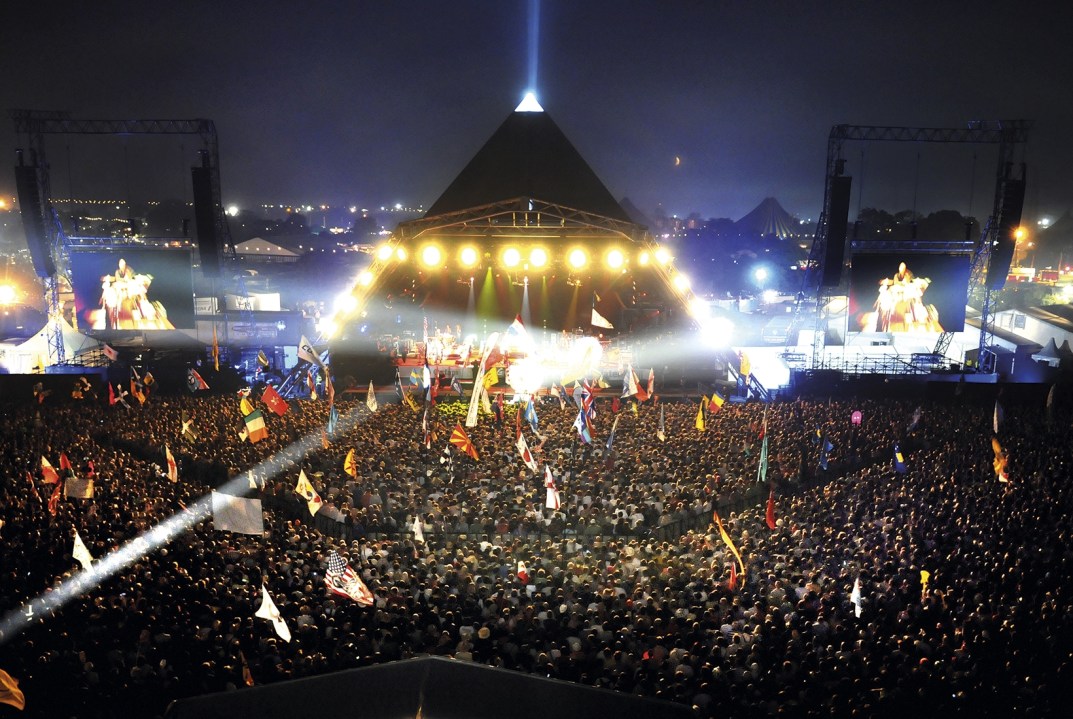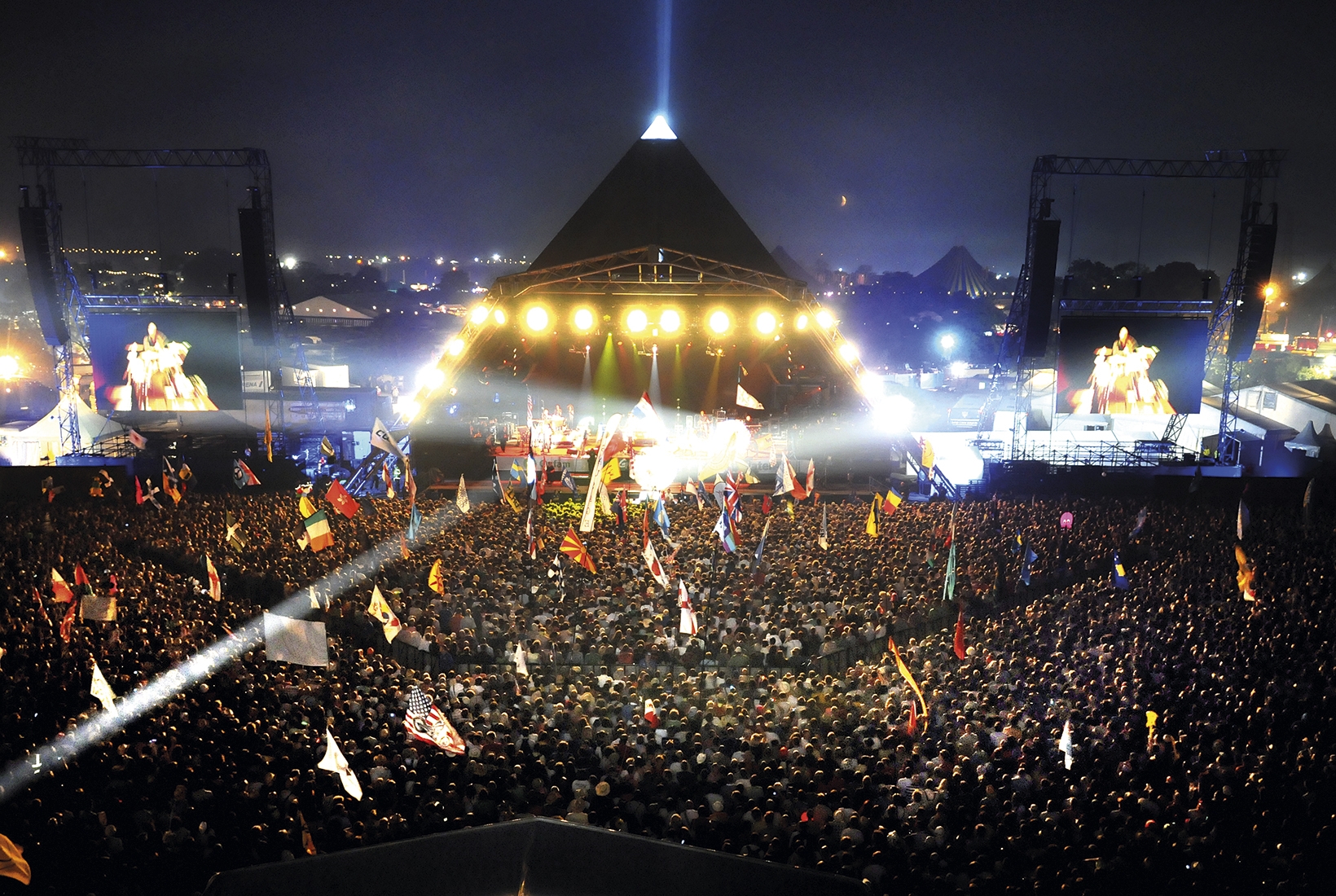The Glastonbury festival has undergone a series of metamorphoses in the 31 years since I first attended as a 15-year-old fence hopper (as, indeed, have I, thank heavens). One of the most significant changes, to pillage Gil Scott-Heron’s famous prophecy, is that the evolution has been televised. Back in 1989, if your boots weren’t on the ground — often a quagmire, though not that year — you missed out on all the fun.
This has not been the case for aeons. Television coverage of Glastonbury began on Channel 4 in 1994, switching to the BBC three years later. In recent times, the Beeb has sent its staff in numbers comparable only to its coverage of the Olympics and World Cup, causing perennial hand-wringing in certain quarters over whether the trip to Somerset denotes a justifiable deployment of resources or a mass staff jolly.
Last year the station devoted more than 30 hours of screen time to the festival, across BBC1, 2 and Four. More than 100 performances from the main stages were available via iPlayer and red button. This year, despite Glastonbury’s 50th anniversary shindig falling foul of the Covid-19 pandemic, the schedulers have hardly broken stride. Perhaps a fallow year on all fronts would have sharpened our appreciation — but no. In TV terms, the 2020 festival is still on, even though it’s off. A habitual armchair attendee might struggle to notice much difference.
This weekend the BBC is running the ‘Glastonbury Experience’ across all platforms, even launching a dedicated pop-up iPlayer channel, as part of a digital strip-mining of past festivals. Most years there are only three headliners. In 2020 you can take your pick. Historic sets by David Bowie, Beyoncé, Coldplay, the Cure, Adele and Jay-Z will be shown in full, alongside hundreds of selected highlights from other years, other stages.
Television is a flat medium; Glastonbury is beautifully bent
It’s a moment to consider what television has given to the festival, and what it has taken away. Writing on the BBC website last year, the corporation’s head of music, Mark Stirling, said: ‘It’s pleasing when people tell me that our programming makes them feel like they don’t need to actually go to Worthy Farm.’ Which begs the question: if you’ve never been, how would you know?
Having done both, I can safely say that sofa surfing is no substitute for being there. Television is a flat medium; Glastonbury is beautifully bent. I watched the Cure headline the wild festival of 1990, and saw them from my sofa last year. The former lives indelibly in my mind, less for the music than for the experiences the music framed (including a truck rolling inches past my head at 4 a.m.). Last year’s TV relay passed the time agreeably, little more. I doubt I’ll seek it out again this weekend.
Once you’ve been, you realise that television makes Glastonbury feel far more like a conventional, commodified rock festival than is the case. The rammed, glittery, flag-waving crowds that gather to watch the headliners on the pyramid stage are disproportionately represented. In reality, Glastonbury is a pop-up city spanning numerous neighbourhoods and several virtual time zones. Large parts of the site don’t get going until after midnight, and what occurs there stays off-grid for good reasons.
Does this taming by television matter? Not really. Glastonbury’s rise as a broadcast event has marched hand in hand with an upsurge in media hype and saturation, transforming the festival into a much bigger, more business-like proposition. On the ground, however, the damage is negligible. While football lives in constant panic over the impact of live broadcasts on match attendances, in this case television has only whetted demand. Last year, 2.4 million people registered for just over 200,000 tickets, which sold out in 30 minutes.
Meanwhile, the draw of a global TV audience has increased the festival’s appeal tenfold, bringing ever greater glitz and glamour to the top of the pyramid. Compare the international star power of 2020’s (stood-down) headliners Paul McCartney, Kendrick Lamar and Taylor Swift with their 1989 equivalents, Suzanne Vega, Elvis Costello and Fela Kuti. Glastonbury now offers the best of both worlds. Whatever esoteric delights you seek, they can still be found in the fields of Avalon during the last weekend in June. Yet you can also watch Stormzy storm the main stage.
It’s true that television encourages a cautious approach to creativity. Blockbuster performances are now choreographed to the nth degree, set lists signed off with broadcasters well in advance. In common with all major concerts these days, spontaneity is at a premium. Technology leads, the artists follow.
Not that everyone has bowed to the box over the years. The big draw of the BBC’s 2020 schedule is the first full airing of David Bowie’s set from 2000. At the time Bowie refused permission for the majority of his concert to be broadcast. In the end, the television audience saw less than a third of it. Aside from damage limitation — if a performance falls flat on telly, it really falls flat; just ask U2 — it was a canny recognition that legacy building is a long race. Undimmed by over-familiarity, Bowie’s Glastonbury set was released posthumously as a live album in 2018, by which time it had assumed ‘classic’ status. Twenty years after the fact, its unexpurgated broadcast can be framed as a genuine event. From beyond the grave, Bowie continues to curate his career with guile.
There have been other stand-offs. In 1994, Elvis Costello wouldn’t allow his set to be filmed — at home, you could hear him thumping away somewhere in the Somerset gloaming as Mark Radcliffe rather sheepishly addressed the camera — apparently because the request to film was made too late. In 2009, Neil Young put his foot down, limiting the BBC to five songs from his set, because ‘he believes in the live event and retaining its mystery’. The same reasons were cited in 2013, after lengthy negotiations between the Rolling Stones and the BBC resulted in only an hour of their headlining show being broadcast. ‘I think Mick Jagger wanted to play to the people here, rather than a TV show,’ said Michael Eavis. Knowing the Stones, lucre might have also been a consideration.
Even now, broadcast rights are subject to accommodations over timings and song choices. Some musicians don’t want to show their entire hand to the world midway through a tour. Others share Young’s belief that myths are built in the retelling, not the watching. Most contemporary artists, for whom singing to screens is as natural as breathing, recognise that this is the age of ‘pics-or-it-didn’t-happen’ — and many appreciate the quality of the coverage. I recently spoke to Radiohead guitarist Ed O’Brien, a Glastonbury regular, who admired how well the BBC captures the feel of the festival, if not its breadth. Something of its essential spirit seeps through the screen.
Television cameras are hardly alien invaders. Since Bill Haley & the Comets performed ‘Rock Around the Clock’ at the end of the 1955 movie Blackboard Jungle, popular music has enjoyed a symbiotic relationship with the screen. The cathode-ray tube didn’t simply reflect pop; it created our pop stars. The Beatles’ appearance on The Ed Sullivan Show made them overnight gods in the States. Bowie became the favoured alien of a generation singing ‘Starman’ on Top Of the Pops. Live Aid was a TV event first, a concert second. One reason why pop music feels so fragmented these days is that there is no longer a unifying television show acting as a symposium for its various tribes. In its absence, three days of wall-to-wall Glastonbury once a year seems a fair trade-off.
And while the festival has been changed by television, the influence has worked both ways. Outside broadcast ‘event telly’ — or should we call it ‘festival telly’ — didn’t flourish in a vacuum. Time Team started the same year as Glastonbury coverage, kick starting a fashion for community-minded ‘real-time’ shows, where digging around wholesomely in the great outdoors was a proxy for spiritual excavation.
The trend seeped into daily programming. Springwatch, where haybales are favoured over chairs, ospreys are accorded superstar status, and technology facilitates a deep dive into ancient Britain, is one of many programmes infused with the Glastonbury spirit. The 2012 Olympics opening ceremony was filled with it. In this world, Nick Knowles is the Jo Whiley of the DIY makeover, and The Great British Bake Off is the village fête cake stall micro-dosed with a tincture from Worthy Farm. That reporter on the breakfast news chuntering pointlessly from a field of gold? Thank Glastonbury.
Perhaps television’s most potent bequest is the Glastonbury Moment, a bite-sized highlight that can be pumped around the world in a heartbeat. Last year’s winner was Alex Mann, a 16-year-old local lad who jumped on stage during a set by Dave, the Brit award-winning rapper, and delivered a flawless verse. We’ll see a lot of Alex this weekend, I’d wager. At these moments, Glastonbury becomes a shared experience involving millions, rather than thousands. We aren’t there, but we’re there. And without those damned flags blocking the view.
‘The Glastonbury Experience’ will run right across BBC TV and radio until 29 June.







Comments